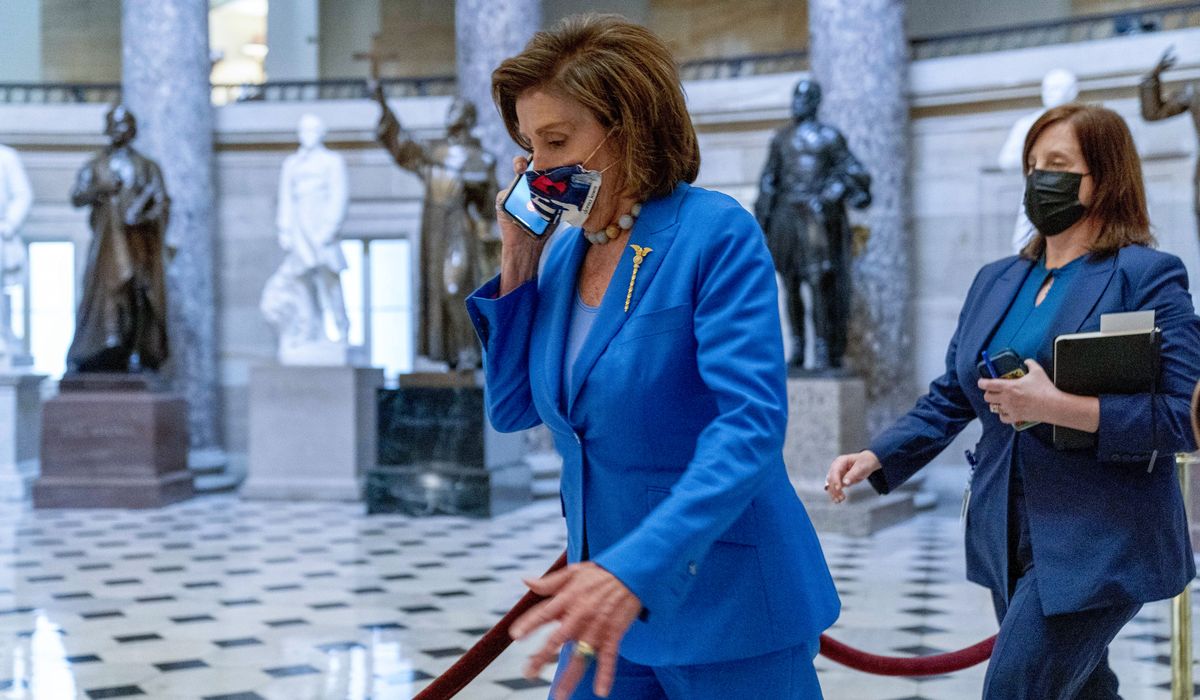
The House of Representatives narrowly passed a debt-ceiling increase on Tuesday, averting a default on U.S. debts until at least December when lawmakers will once again face a showdown on the issue.
In a 219-206 vote that strictly followed party lines, the House used a special parliamentary procedure to pass the bill with limited debate and no official recorded vote.
House Speaker Nancy Pelosi, California Democrat, tied the increase to a measure advancing debate on three noncontroversial bills.
“The speaker [used] a procedural gimmick to allow the debt ceiling to pass under a ‘rule’ — which will prevent a recorded yes or no vote on the bill to raise the debt ceiling — and simply deem it to be passed without a vote,” said Rep. Barry Loudermilk, Georgia Republican.
As such when lawmakers voted to advance the noncontroversial bills, they also raised the cap on how much the federal government can borrow to pay its expenditures by $480 billion.
“We are back today to do the debt ceiling and this will go until Dec. 3,” Mrs. Pelosi said. “If we do not lift the ceiling, there would be a loss of 6 million jobs, $15 trillion in household wealth, and drastically increase the cost … domestically, and I do not just mean within the United States, I mean at the kitchen table.”
The increase, which passed the Senate last week, now heads to President Biden’s desk. He is expected to sign it before Oct. 18, that date by which the Treasury Department has warned the federal government will run out of money to pay its bills.
While the legislation helps avert a default on U.S. debts, it also sets up a showdown between Democrats and Republicans in the near future.
Senate Minority Leader Mitch McConnell, who provided the votes to pass the short-term increase, has ruled out further support for raising the debt ceiling. Mr. McConnell, Kentucky Republican, argues that if Democrats are content to push a “tax and spend” agenda, they should be responsible for making it possible.
“Republicans filled the leadership vacuum that has troubled the Senate since January,” wrote Mr. McConnell in a letter to the White House last week. “I will not provide such assistance again if your all-Democrat government drifts into another avoidable crisis.”
GOP lawmakers have urged Democrats to raise the debt ceiling unilaterally via budget reconciliation.
The process, which Democrats are planning to use to ram through Mr. Biden‘s $3.5 trillion social welfare bill, allows specific spending and tax measures to avert the Senate‘s 60-vote filibuster threshold and pass with a simple majority.
Democratic leaders are wary of using the process because it would force them to specify a new amount for the nation’s borrowing limit.
The number, which would be above the current limit of $28.8 trillion, opens vulnerable lawmakers to attack during next year’s midterm elections.
They also say that placing the responsibility solely on the party in power is unfair as the current federal is made up of spending from both Republican and Democratic administrations.
“This is our debt. This is America’s debt … Some of it relates to greater spending promoted by both sides of the aisle,” said House Majority Leader Steny H. Hoyer, Maryland Democrat. “For any one of us to get up and say, ‘It’s your debt.’ It’s America’s debt and America pays its bills.”








